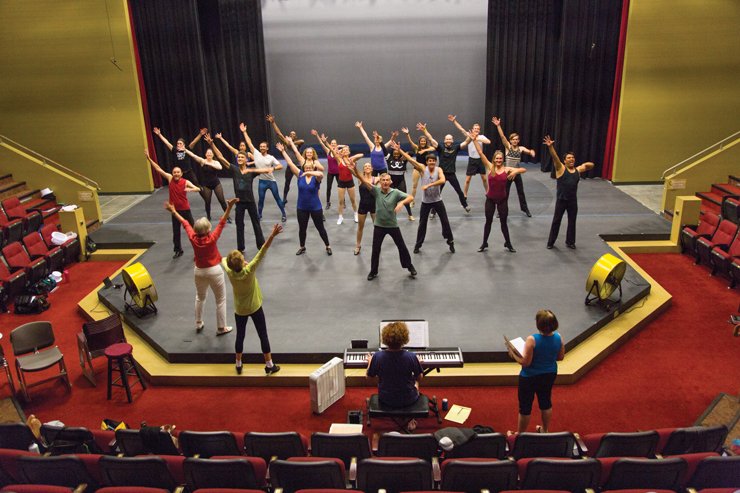If you’re reading this—heck, if you’re even on this website—you already know and understand the value of the arts and theater in particular when it comes to our lives and the world around us. But I’m here to remind you that not everyone sees it that way, and there is quite an uphill battle we face in many communities.
A few weeks ago I was trying to be an Arts Hero by hopping on an Instagram comment thread to mention the importance of arts funding and was met with more backlash that I had anticipated.
Little did I know how controversial it would be to say that the arts is one of the least supported areas of government funding yet is also one of the most uplifting. However, most people in this comment thread didn’t want to see government funding the arts (this discussion started on Philadelphia, Pennsylvania but broadened out from there). I realize social media is just a slice of the population and its sentiments, but here’s just a few of the comments made:
• “Arts aren’t necessary, education is.”
• “Why can’t the rich fund the ‘arts’ and the government stay in their own lane?”
• “Who funded Shakespeare? If I want to see the art, I can pay for it.”
• “Taxing for the arts is still unjustified”
• “It’s not a NEED. General education is.”
• “There is nothing uplifting about being poor and unable to support yourself yet watching money being spent on dancing.”
While I agree that federal and state funds are often mismanaged and can go toward frivolous pet projects, there are certainly far more wasteful items in government budgets than funding the arts. And yes, it’s true that pursuing a career in the arts can be challenging, but the rewards, not just for the individual artist but for society as a whole, are immeasurable. Let’s explore why the world needs artists and why the skills we acquire as artists are indispensable.
First and foremost, the arts have an irreplaceable role in shaping our culture and reflecting the complexities of the human experience.
Through the canvas, the stage, the screen, and the written word, artists can capture the essence of our times, conveying emotions, ideas, and narratives that resonate with audiences on a very personal level. Whether it’s a breathtaking painting, a soul-stirring song, or a gripping play, the arts have the power to inspire, challenge, and provoke thought like no other medium.
But let’s not forget that being an artist is about more than just looking pretty and saying our lines or creating beautiful pieces for others to look at; it’s about developing a unique skill set that has far-reaching applications. As artists, we learn the art of empathy, of stepping into the shoes of characters with diverse backgrounds and experiences. This ability to see the world from different perspectives is invaluable in a society where understanding and respecting one another’s viewpoints is essential for harmony.
Furthermore, artists are masters of communication. Whether it’s conveying a complex emotion through a dance performance or crafting a compelling narrative in a novel, our ability to communicate effectively is honed through years of practice. Think about it: effective communication, empathy, and the ability to read and understand people are all integral parts of acting. These skills are incredibly useful in various aspects of life, from negotiations in the boardroom to soothing a crying child or even nailing a job interview. Once in the workplace, artists often excel in public speaking, storytelling, and creative problem-solving—qualities that are highly sought after in today’s dynamic job market.
Now, let’s talk about the industry itself.
The entertainment world can be brutal, and not everyone you encounter will have your best interests at heart. But guess what? That’s true in almost any field. It’s a tough world out there, and you’ll encounter difficult people and challenging situations no matter where you work. The key is learning to navigate these waters with professionalism and grace, and the resilience you build in the acting world will serve you well in any career.
The arts also play a vital role in education. Numerous studies have shown that exposure to the arts enhances cognitive development, creativity, and critical thinking skills in students. Programs that incorporate the arts into education can lead to higher academic achievement and improved social and emotional well-being. In this way, artists contribute to the next generation’s growth and development, helping to shape a brighter future for society.
Furthermore, the arts are a driving force in local communities.
Art galleries, theaters, and cultural events are not just venues for entertainment; they are hubs of creativity that foster a sense of community and belonging. They attract tourists, stimulate local economies, and provide a platform for emerging artists to showcase their talents. In doing so, the arts help create vibrant, culturally rich neighborhoods that are appealing to residents and visitors alike.
So while the artist’s journey may be filled with potholes and parking tickets and people who can’t see our value, don’t lose sight of the fact that there are real skills being developed with real-world applications. It’s not just about chasing fame; it’s about honing your craft and, most importantly, making a difference in the lives of others as well as your own. So let’s keep auditioning and creating and reminding others why funding the arts is so important, not just for our own livelihood but for their lives as well.
…
Thanks for reading CircusTalk.News.
Support us by registering and subscribing!
FOR UNLIMITED ACCESS TO ALL NEWS CONTENT + JOB LISTING.
Do you have a story to share? Submit your news story, article or press release.






